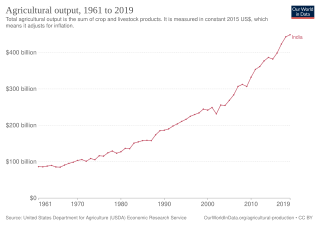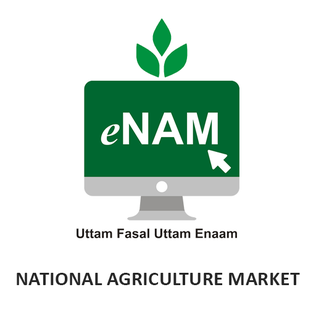
State Bank of Mysore was a Public Sector bank in India, with headquarters at Bangalore. It was one of the five associate banks of State Bank of India, all of which were consolidated with the State Bank of India with effect from 1 April 2017.

All India Kisan Sabha, is the peasant or farmers' wing of the Communist Party of India, an important peasant movement formed by Sahajanand Saraswati in 1936.

Cooperative banking is retail and commercial banking organized on a cooperative basis. Cooperative banking institutions take deposits and lend money in most parts of the world.

National Bank for Agriculture and Rural Development (NABARD) is an apex regulatory body for overall regulation of regional rural banks and apex cooperative banks in India. It is fully owned by Ministry of Finance, Government of India. The bank has been entrusted with "matters concerning policy, planning, and operations in the field of credit for agriculture and other economic activities in rural areas in India". NABARD is active in developing and implementing financial inclusion.

The history of agriculture in India dates back to the Neolithic period. India ranks second worldwide in farm outputs. As per the Indian economic survey 2020 -21, agriculture employed more than 50% of the Indian workforce and contributed 20.2% to the country's GDP.

The Ministry of Agriculture and Farmers Welfare, formerly the Ministry of Agriculture, is a branch of the Government of India and the apex body for formulation and administration of the rules and regulations and laws related to agriculture in India. The three broad areas of scope for the Ministry are agriculture, food processing and co-operation. The agriculture ministry is headed by Minister of Agriculture and Farmers' Welfare which is currently held by Narendra Singh Tomar. Kailash Choudhary and Shobha Karandlaje are the Ministers of State. Sharad Pawar, serving from 22 May 2004 to 26 May 2014, has held the office of Minister of Agriculture for the longest continuous period till date.
The economic liberalisation in India refers to the series of policy changes aimed at opening up the country's economy to the world, with the objective of making it more market-oriented and consumption-driven. The goal was to expand the role of private and foreign investment, which was seen as a means of achieving economic growth and development. Although some attempts at liberalisation were made in 1966 and the early 1980s, a more thorough liberalisation was initiated in 1991.

The Aryavart Bank (AB) is an Indian Regional Rural Bank (RRB) in Uttar Pradesh established on 1 April 2019. The bank was formed by the amalgamation of Gramin Bank of Aryavart and Allahabad UP Gramin Bank. It currently has 1365 branches and 22 regional offices in rural areas of Uttar Pradesh, around Lucknow.

Abhijit Sen was an Indian economist who focused on studying rural development. Sen was appointed to the Planning Commission of India between 2004 and 2014 and held a number of policy making positions in India. Amongst his works included recommendations toward establishment of minimum support price for farm produce and a universal public distribution system.
From the 1991 India economic crisis to its status of third largest economy in the world by 2011, India has grown significantly in terms of economic development, so has its banking sector. During this period, recognizing the evolving needs of the sector, the Finance Ministry of the Government of India set up various committees with the task of analyzing India's banking sector and recommending legislation and regulations to make it more effective, competitive and efficient.
Priority sector lending is lending to those sectors of the economy which may not otherwise receive timely and adequate credit. This role is assigned by the Reserve Bank of India to the banks for providing a specified portion of the bank lending to few specific sectors like agriculture and allied activities, micro- and small enterprises, education, housing for the poor, and other low-income groups and weaker sections. This is essentially meant for an all-round development of the economy as opposed to focusing only on the financial sector.
Sardar Bhupinder Singh Mann, born in Gujranwala on 15 September 1939 was nominated to the Rajya Sabha in 1990 by the Honorable President of India as recognition to his contribution to the farmers' struggle. He served from 1990 to 1996. His family moved from Lyallpur, now Faisalabad during partition to settle at Batala. His father S. Anoop Singh was a prominent landlord of the area and Chak 207 in Faisalabad is still named after him.
The 2014 Union Budget of India was presented by Finance Minister, Arun Jaitley on 10 July 2014,11 am. This was the first budget of Narendra Modi led NDA government.
The Karnataka Vikas Grameena Bank (KVGB), an Indian Regional Rural Bank sponsored by Canara Bank. It is under the ownership of Ministry of Finance, Government of India. The bank provides retail banking services to rural users and has 629 branches in areas of Karnataka, around North and Western Karnataka.

The Pradhan Mantri fasal bima yojana (PMFBY) launched on 18 February 2016 by Prime Minister Narendra Modi is an insurance service for farmers for their yields. It was formulated in line with One Nation–One Scheme theme by replacing earlier two schemes National Agricultural Insurance Scheme (NAIS) and Modified National Agricultural Insurance Scheme (MNAIS) by incorporating their best features and removing their inherent drawbacks (shortcomings). It aims to reduce the premium burden on farmers and ensure early settlement of crop assurance claim for the full insured sum.

National Agriculture Market or eNAM is an online trading platform for agricultural commodities in India. The market facilitates farmers, traders and buyers with online trading in commodities.
Pradhan Mantri Kisan Samman Nidhi is an initiative by the government of India that give farmers up to ₹6,000 (US$75) per year as minimum income support. The initiative was announced by Piyush Goyal during the 2019 Interim Union Budget of India on 1 February 2019. The scheme has cost ₹75,000 crore per annum and came into effect December 2018.
The Department of Agriculture and Farmers' Welfare (DA&FW) is one of the three constituent department of Ministry of Agriculture and Farmers' Welfare, the other two being Department of Agriculture Research and Education (DARE) and Department of Animal Husbandry and Dairying. The Department is headed by Minister of Agriculture and Farmers' Welfare.
National Action Plan for Climate Change (NAPCC) is a Government of India's programme launched in 2008 to mitigate and adapt to the adverse impact of climate change. The action plan is designed and published under the guidance of Prime Minister’s Council on Climate Change (PMCCC). The 8 sub-missions aimed at fulfilling India's developmental objectives with focus on reducing emission intensity of its economy. The plan will rely on the support from the developed countries with the prime focus of keeping its carbon emissions below the developed economies at any point of time. The 8 missions under NAPCC are as follows:









